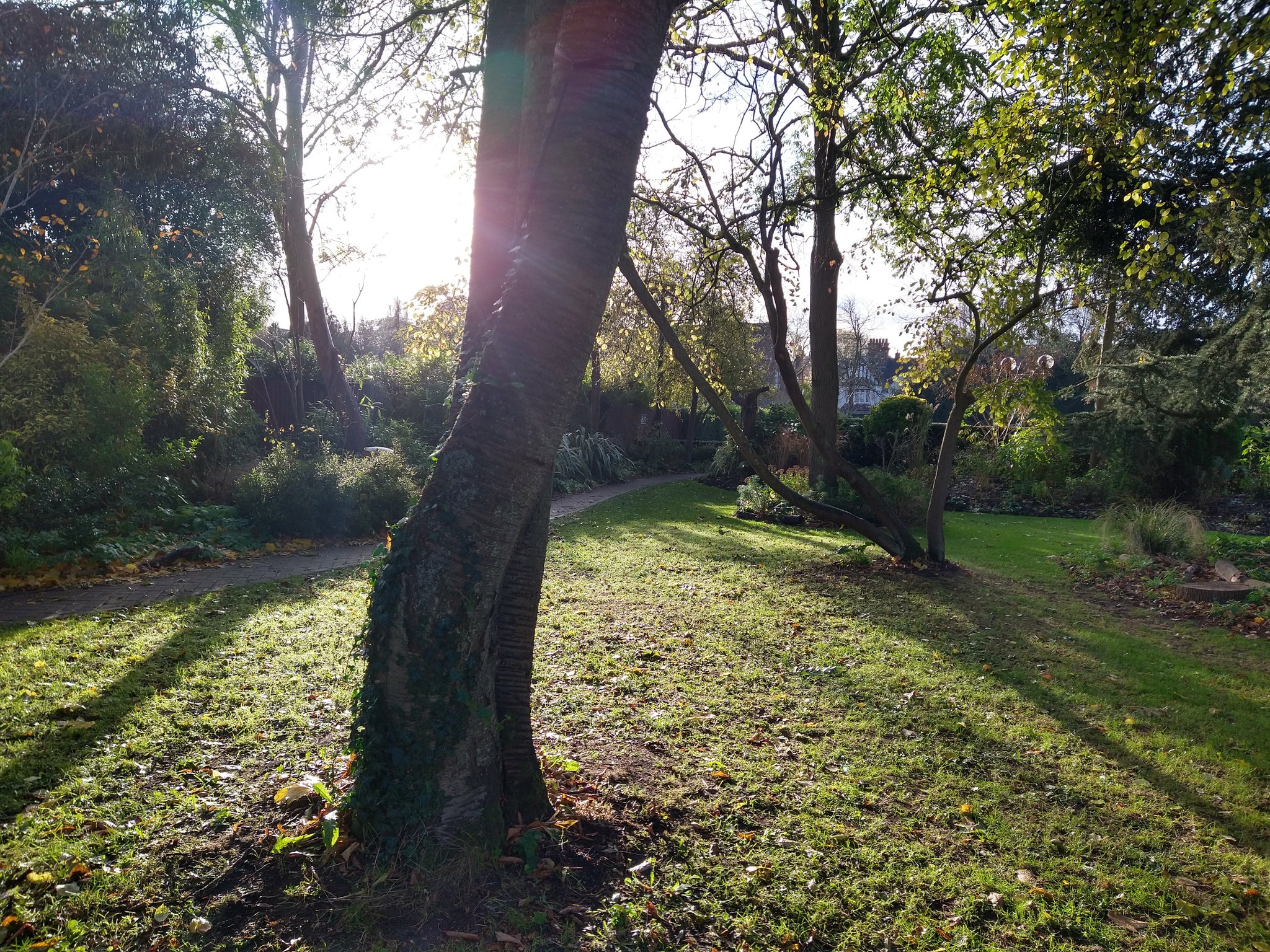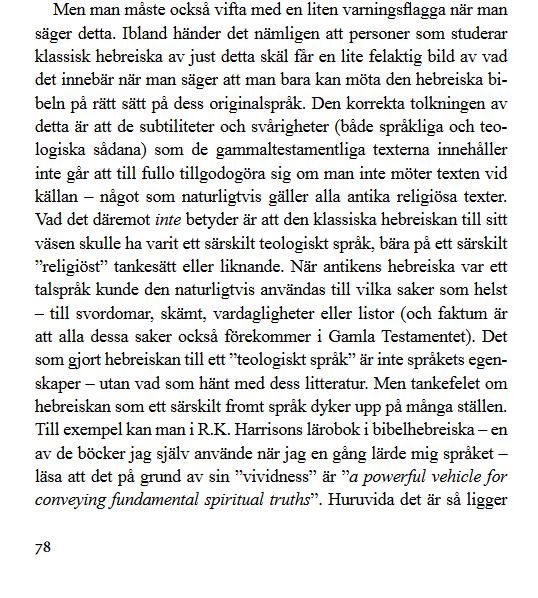On Wednesday Nov 9 2022, there will be an even on Indo-European poetics at the Swedish Collegium in Uppsala, featuring Bo Ralph, Peter Jackson and Yours Truly. I'll be talking about "The Conquering Baal and the Name of Indra: Linguistic and Poetic Encounters in Bronze Age Syria". The whole thing will be streamed over Zoom, so do join if you wish. A flyer with the link and info can be found here!
"Låt texten vara död."
Ola Wikander skriver och funderar om gamla språk och vad de betyder för honom - om hebreiska, ugaritiska, grekiska, hettitiska, latin, gotiska och någon gång kanske till och med hurritiska. Han grubblar kring kanaaneisk religion, främreorientaliska studier och skönlitteratur - och om vår allmänna kulturskymning.
måndag 7 november 2022
Dead Poets!
fredag 6 maj 2022
Serafrecension
tisdag 15 mars 2022
The Carps of March

måndag 14 mars 2022
Go West!

söndag 13 mars 2022
Then Swänska rollspelshobbyn lefwer
En sak som är väldigt kul för en gammal rollspelare från 80- och 90-talen är att den svenska rollspelsutgivningen under de senaste åren kommit in i ett slags tredje andning. Åter ges det ut mängder av rollspel, och hobbyn har fått kickstarter som ny finansiär, så att säga. Till och med KULT har återuppstått. Har själv just en spelgrupp som spelar den gamla klassikern Den svarta Madonnan (av Gunilla Jonsson och Michael Petersén), som nu nyutgivits i vacker engelsk utgåva, fast omstöpt till spelet Anima: Beyond Fantasy (alltså mer japanskt stuk än dystert Europa). Hur kul som helst, i alla fall. Har alltid älskat det äventyret. Mina egna fantastikböcker är starkt påverkade av min rollspelsuppväxt, om någon läsare nu skulle ha missat den saken.
Lefwe then Swänska rollspelshobbyn! Här är förresten en krönika om rollspelshobbyn jag skrev för ett antal år sedan.
onsdag 26 januari 2022
Radioaktiv
Skall hastigt och lustigt vara med i dagens Studio Ett i radio och diskutera frågan om långttidsbevarande av språklig information kring kränbränsleavfall (vilket jag hade ett forskningsprojekt kring för några år sedan, vilket ledde till två artiklar).
I samma ämne deltar jag i podden Studio Anekdot, som kan höras här!
UPPDATERING: Radioinslaget ställdes in i sista stund, på grund av tal från statsministern.
fredag 10 december 2021
Cantabrigian
Now, I've spent my first two months (and a bit) in Cambridge, as a visiting fellow at the Centre for Research in the Arts, Social Sciences and Humanities (with the wonderful abbreviation CRASSH). On Saturday, I return to Sweden for the Christmas break. It's been two quite intense months, and I've done a lot of writing, especially on my new monograph. Some other stuff has been going on, too:
I've published a new article in Svensk exegetisk årbok, on "L's and S's in the Land of Israel" - which can be read here.
There's been a Q & A published with yours truly on the CRASSH website on the scholarship I'm doing while here in Cambridge - see here!
I've also started doing a few readings of ancient languages on Youtube -
here's one in Old Babylonian Akkadian (with Swedish introduction) from the OB Gilgamesh. With ejectives and everything!
And here's one in Classical Hebrew, with my classicized Mizrahi-style pronunciation: Isaiah 1:1-10.
And here's a bit of Ugaritic, Baal's cosmic message for Anat (translation in the description).
And here's me doing an impromptu Vedic recital (with accents and stuff) at the inauguration of the Stockholm University Indo-European Languages Center in September.
Oh, and there's some Hittite, too!
And here's a beautiful picture from Wolfson College, where I'm staying:

lördag 23 oktober 2021
Fables and Serpents!
Two new things with yours truly - one in English, one in Swedish! Let's start with the Swedish one - a radio essay for OBS/P1 on animal fables (including Fablernas Värld, the Indian Pañcatantra, the Hurrian Epic of Liberation and my own scholarship on Genesis 32. Listen here!
The English thing is a Youtube version of a lecture/presentation I held at the PIER (Proto-Indo-European Reconstruction) conference in Cambridge - funnily enough, one day before leaving for actual Cambridge, where I am now! It's a bit technical, but there may be some interesting stuff in there. The title is The Sound of Serpents and Serpent-Slayers in Indo-European and Northwest Semitic, and it's on snake monsters and heroes killing them - a topic to which I tend to return. Here, it's on borrowing of poetic phrases from early Indo-European into Semitic, and into the world of the Hebrew Bible. Watch it here!
fredag 15 oktober 2021
Undeep morphology
Just saw a book online, which shall remain nameless. It had a big argument about the Vedic word for sky, dyāvā, which is dual, and how this fact (the dual number) implied a very special type of integration or union.
Nope.
It is dual because
it is normally part of a standard compound, dyāvā-pṛthivī
(“heaven and earth”), which has two members (thus dual), and the
dual number is kept when only one of the two is used (on this, see
here:
). So, the dual number means…. Nothing at all. Except for heaven
and earth being, you know, two. It can elliptically mean "heaven and earth" (subtextually implying the second part of the compound), but there is no union, integration of other "special" meaning here.
Please stop believing normal features of ancient languages are somehow more mystical! I did a little rant on this in my latest book Ett hav i mäktig rörelse: om de semitiska språken (2019), on the subject of Hebrew. For those who can read Swedish, here it is:
tisdag 29 juni 2021
No, not serious
A Twitter interaction, started by this account and carried on by yours truly :-)
And, adding to the fun (if you know a certain Swedish tongue-twister):
lördag 27 mars 2021
Old Darius
Current events make me think of old King Darius of Persia, who famously wrote:
fredag 2 oktober 2020
Philology and Exegesis – and an advertisement for a bunch of lectures!
When I was in my adolescent years, and first got into the study of ancient languages, I was – of course – in many ways a different person. One aspect of this was the fact that I cared relatively little about what was actually in the texts I was reading – content-wise, I mean. To me, the verbal forms, the inflections, the endings were all that mattered. I found – and still do find – immense, almost visceral pleasure in the analysis of complex morphological formations. They can truly be works of art. To see, step by step, how the Hebrew form wayyamlîḵûhû must mean “(and) they made him king” (hifˤîl 3rd person masculine plural imperfect consecutive of the root m-l-k) is quite the good feeling. And there are so many even more exquisite (and less regular) examples.
What changed when I started studying at the University level – and arrived in the department of Theology, studying Old Testament Exegesis, in a sort of pretzel way – was the disconnect between form and content. During those years, I learned to love the intersection between linguistics/philology, history of religion and textual analysis that makes the exegetical field what it is. I now tend to view them as a beautiful triangle, with each apex reinforcing the others – the philology and linguistics being the pathway into the reconstructed worlds of thought that the texts carry within them, like layers of an onion, with every step of redaction and reinterpretation as a single piece of the history of human imagining.
Funnily enough, I now publish more on purely linguistic subjects than I did when I was younger, but the aim towards that semi-magical combination is always there. Using typological parallels from Tocharian, Old Irish and Classical Japanese to analyze the creation of a verbalform in Biblical Hebrew, for example, also has implications for the rise of that verbal form as a medium of telling epic narratives, something that forms an integral part of the larger scholarly project I am currently involved in (focusing on Northwest Semitic poetic-narrative language). So even when I am doing very linguistically focused stuff, the other two apices of the triangle are constantly there in my mind. Exegesis is philology, and history of religion, and historical textual analysis. The magic happens at the center of that triangle.
… and why am I writing this in English, by the way, on this normally Suecophone blog? Well, as can be seen, the blog has fallen into abeyance in later times: the thing has been going for more than twelve years now, and I have found it hard to come up with stuff to write here lately. So, for a mental change of pace, I intend to add some Anglphone stuff. We shall see how it turns out.
And…
speaking of which! On Monday October 5, I shall be giving a short (20-25 mins)
lecture entitled “L’s and S’s in the Land of Israel: Lateral Soundplay in the
Hebrew Bible and its World”, as part of the annual “Exegetical Day” of the
Swedish Exegetical Society. The most excellent Dan Nässelqvist (Lund) and Jacqueline
Vayntrub (Yale) will also be giving talks, on “Aural Clues as Guides to the
Interpretation of New Testament Texts” and “Performance and Textuality in
Biblical Poetry” respectively. The lectures are in English, will be given
online (as so often these days) and are open to the public. The Zoom link is:
https://lu-se.zoom.us/j/69598558886
The schedule is:
14.00 Swedish time – me
14:45 Swedish time – Dan
15:30 Swedish time – Jacqueline
Come join us and listen to three examples of the lovely interactions between textual study, philology and linguistics!
torsdag 7 maj 2020
I huvudet på Athena
Vetenskapssocietetens i Lund vackra jubileumsbok I Pallas Athenas huvud, med många roliga artiklar kring humaniora och humaniorans roll vid Lunds universitet. Själv deltar jag med en essä om textnekromanti, textemulation och att "låta texten vara död" – en utökad version av en text jag deklamerade i radions OBS i höstas. Jag är stolt och glad att få vara med i detta sant lundahumanistiska sammanhang!






